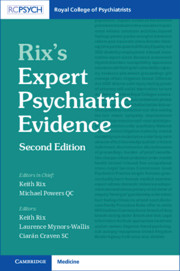Book contents
- Rix’s Expert Psychiatric Evidence
- Reviews
- Rix’s Expert Psychiatric Evidence
- Copyright page
- Contents
- Online Appendices – See Inside Cover for Access
- Contributors
- Foreword to the Second Edition
- Foreword to the First Edition
- Acknowledgements and Preface to the Second Edition
- Acknowledgements and Preface to the First Edition
- Table of Cases
- Table of Statutes and Directives
- Table of Statutory Instruments and Regulations
- Table of Practice Directions
- Table of Codes of Conduct, Guidance, Conventions and Protocols
- Abbreviations
- Chapter 1 The Expert Medical Witness
- Chapter 2 Courts, Laws and Procedures
- Chapter 3 Training, Development and the Maintenance of Expertise
- Chapter 4 Business Matters
- Chapter 5 The Medicolegal Consultation
- Chapter 6 The Report, Amendments, Answers to Questions, Experts’ Meetings and Conferences
- Chapter 7 Reports for Criminal Proceedings and in Prison Cases
- Chapter 8 Reports in Personal Injury Cases
- Chapter 9 Reports for Family Proceedings Relating to Children
- Chapter 10 Reports in Cases Involving Capacity Issues
- Chapter 11 Reports for the First-tier Tribunal (Health, Education and Social Care Chamber) Mental Health
- Chapter 12 Reports in Immigration and Asylum Cases
- Chapter 13 Reports in Employment, Disability Discrimination and Pension Cases
- Chapter 14 Reports for Fitness to Practise, Conduct and Performance Proceedings
- Chapter 15 Reports for Coroners Courts and Fatal Accident Inquiries
- Chapter 16 How to Read an Expert Medical Report
- Chapter 17 Going to Court
- Book part
- References
- Index
- Miscellaneous Endmatter
- References
Chapter 1 - The Expert Medical Witness
Published online by Cambridge University Press: 22 January 2021
- Rix’s Expert Psychiatric Evidence
- Reviews
- Rix’s Expert Psychiatric Evidence
- Copyright page
- Contents
- Online Appendices – See Inside Cover for Access
- Contributors
- Foreword to the Second Edition
- Foreword to the First Edition
- Acknowledgements and Preface to the Second Edition
- Acknowledgements and Preface to the First Edition
- Table of Cases
- Table of Statutes and Directives
- Table of Statutory Instruments and Regulations
- Table of Practice Directions
- Table of Codes of Conduct, Guidance, Conventions and Protocols
- Abbreviations
- Chapter 1 The Expert Medical Witness
- Chapter 2 Courts, Laws and Procedures
- Chapter 3 Training, Development and the Maintenance of Expertise
- Chapter 4 Business Matters
- Chapter 5 The Medicolegal Consultation
- Chapter 6 The Report, Amendments, Answers to Questions, Experts’ Meetings and Conferences
- Chapter 7 Reports for Criminal Proceedings and in Prison Cases
- Chapter 8 Reports in Personal Injury Cases
- Chapter 9 Reports for Family Proceedings Relating to Children
- Chapter 10 Reports in Cases Involving Capacity Issues
- Chapter 11 Reports for the First-tier Tribunal (Health, Education and Social Care Chamber) Mental Health
- Chapter 12 Reports in Immigration and Asylum Cases
- Chapter 13 Reports in Employment, Disability Discrimination and Pension Cases
- Chapter 14 Reports for Fitness to Practise, Conduct and Performance Proceedings
- Chapter 15 Reports for Coroners Courts and Fatal Accident Inquiries
- Chapter 16 How to Read an Expert Medical Report
- Chapter 17 Going to Court
- Book part
- References
- Index
- Miscellaneous Endmatter
- References
Summary
At least since 1282, when a coroner called a surgeon to advise whether an arrow injury to the chest could be fatal (Sayles 1936), doctors have been needed to assist the administration of justice. Dr Andrew Duncan, Senior, recognised this in 1795 in his University of Edinburgh lectures on forensic medicine: ‘Many questions come before the Courts … where the opinion of medical practitioners is necessary either for the exculpation of innocence or the detection of guilt … an opinion consistent with truth and with justice.’ This duty was identified by Percival (1803, p. 120): ‘It is a complaint made by coroners, magistrates and judges, that medical gentlemen are often reluctant in the performance of the offices, required from them as citizens qualified by professional knowledge, to aid the execution of public justice.’
- Type
- Chapter
- Information
- Rix's Expert Psychiatric Evidence , pp. 1 - 11Publisher: Cambridge University PressPrint publication year: 2020

